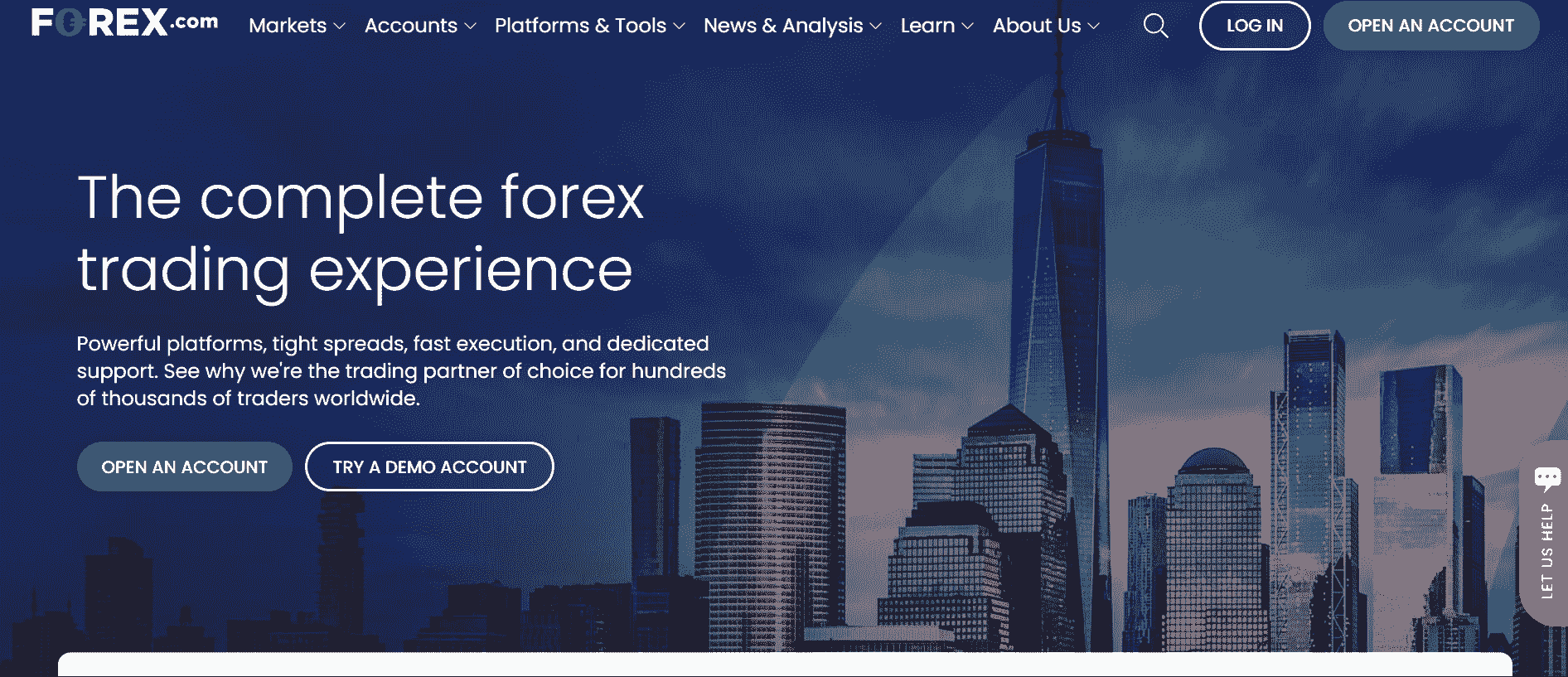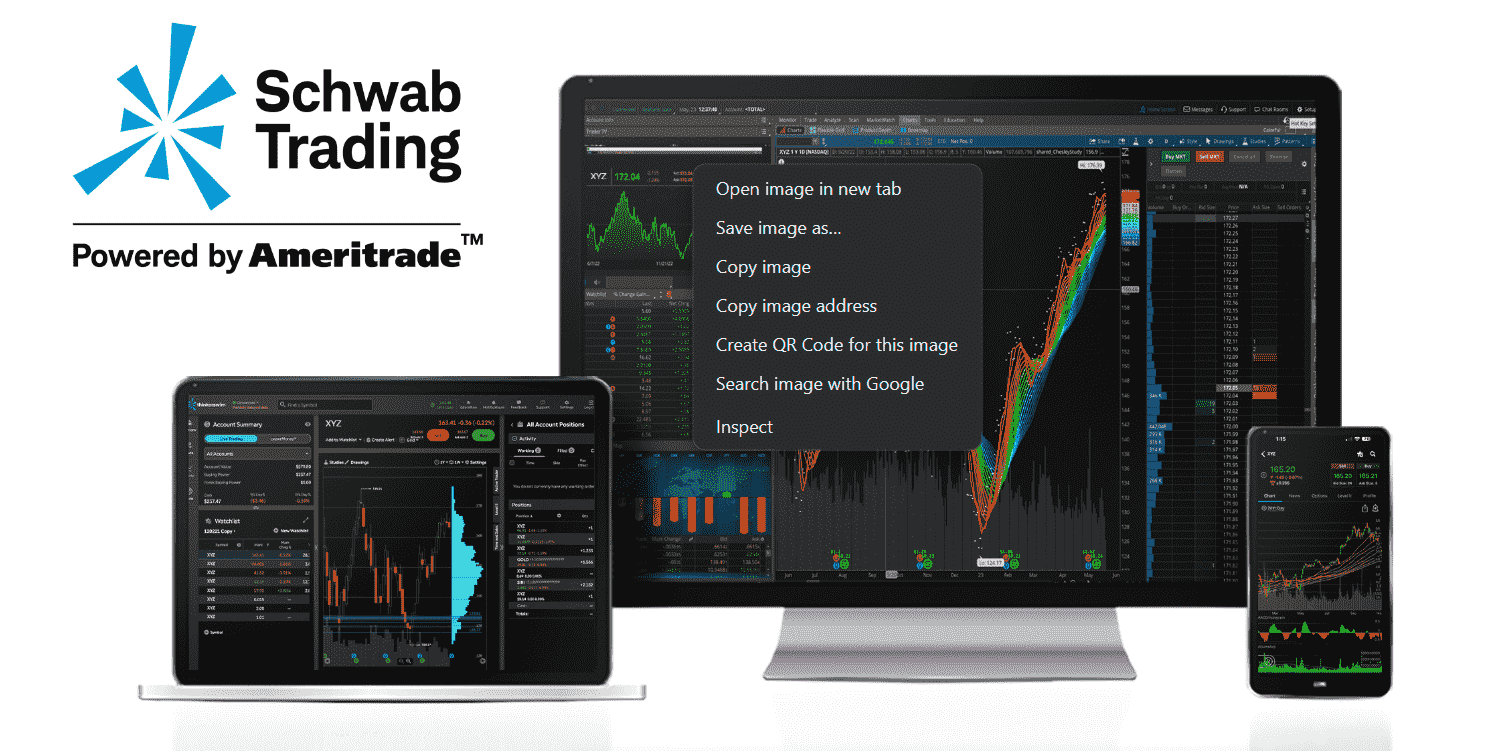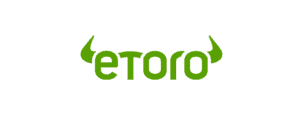Best Commodity Trading Apps 2024 – Top App Revealed
If you’re looking to add to a diverse investment portfolio, then look no further. Commodity trading allows you to speculate on the global market for physical goods like gold, oil, wheat, coffee and more.
In this guide, we’ll review the 10 best commodity trading apps for 2024 and show you how to start trading commodities!
76% of retail investor accounts lose money when trading CFDs with this provider.
[toc]Top Commodity Trading Apps 2024
Here are our picks for the 10 best commodity trading apps in 2024:
- eToro – Overall Best Commodity Broker
- Robinhood – Top Commodity Trading App with Competitive Spreads
- SoFi – Best Commodity Trading App for Advanced Traders
- Forex.com – Best Commodity Broker for Gold and Silver Trading
- Fidelity – Ultra-low Commodity Trading Spreads for Day Trading
- TD Ameritrade – Best Commodity Trading App for Technical Analysis
- IG – Widest Range of Hard and Soft Commodities to Trade
- Interactive Brokers – Best Android Commodity Trading App for Algo Trading
- Charles Schwab – Best Commodity Broker for New Traders
- E*Trade – Popular Stock App Offering Commodity Derivatives
76% of retail investor accounts lose money when trading CFDs with this provider. You should consider whether you can afford to take the high risk of losing your money.
Best Commodity Trading Apps Reviewed
Choosing the best commodity trading app is key to succeeding in the fast-moving commodities market. So, let’s take a closer look at each of the top 10 commodity trading apps to help you decide which is right for you.
1. eToro – Overall Best Commodity Broker

The broker’s spreads are in line with the industry average. eToro does have a small withdrawal and inactivity fee, but these are easy to avoid in most cases.
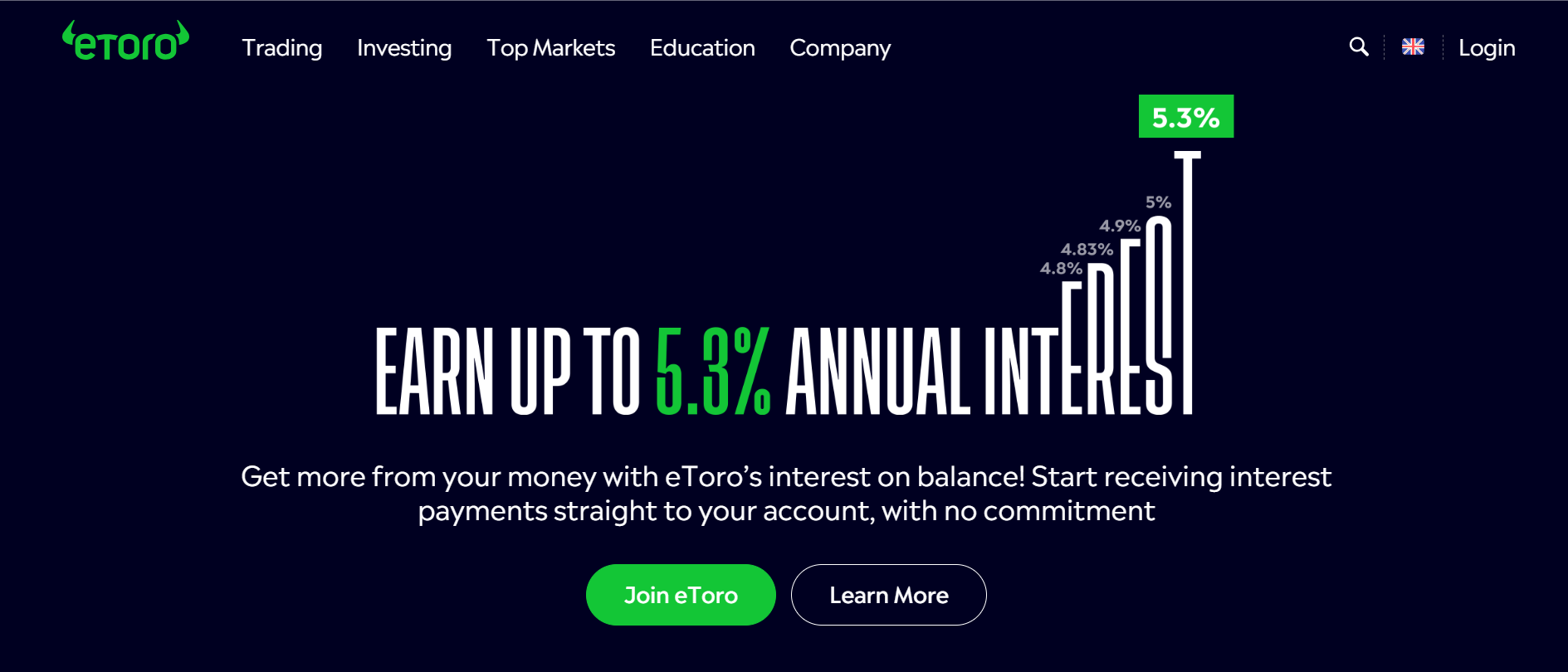
The eToro mobile app is available for iOS and Android, and it’s one of our favorite mobile trading platforms to use. The app has a custom technical analysis suite complete with over 100 technical indicators and drawing tools. It also includes a scrollable news feed and economic calendar to help you stay ahead of the market.
Even better, the eToro app has a built-in social trading network. You can follow tens of thousands of other traders from around the world and share trading strategies. You can also take advantage of the copy portfolios feature to automatically mimic the moves of other commodity traders. This is a simple way to automate your trading. For these reasons many traders consider eToro to be the best day trading app with low fees.
eToro is regulated by the UK’s Financial Conduct Authority (Financial Conduct Authority) and the broker offers 24/5 customer support. You can get in touch over chat right from inside the app.
 Pros:
Pros:
- Trade 13 commodity CFDs and oil futures
- Custom charting platform with 100+ indicators
- Social trading network available on mobile app
- 24/5 in-app customer support
 Cons:
Cons:
- Small inactivity and withdrawal fees
76% of retail investor accounts lose money when trading CFDs with this provider. You should consider whether you can afford to take the high risk of losing your money.
2. Robinhood – Top Commodity Trading App with Competitive Spreads
Robinhood is an exclusive online brokerage firm that caters to traders in the US. The company provides various services, offering various commodities such as energy, metal, and agricultural products. Additionally, Robinhood has an extensive selection of international stocks and ETFs available for trading.
One of the standout features of the app from Robinhood alternatives is its commission-free structure. Regardless of the amount you invest or trade, you won’t be charged any fees. This means you can enter and exit the markets as frequently as you like without incurring costs. However, the broker does apply a variable spread on all supported markets.
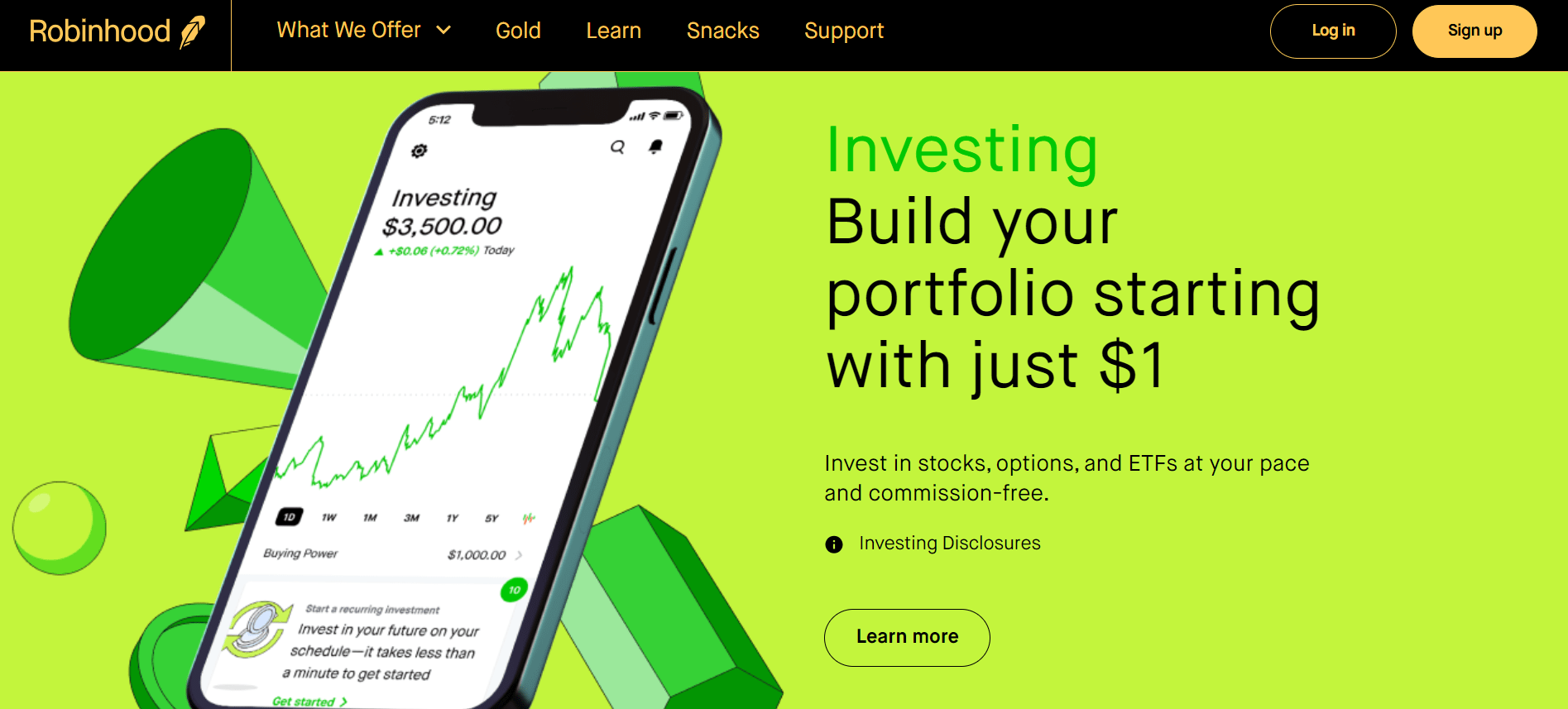
Robinhood is an attractive option for beginners interested in commodities but with limited experience. The platform has been specifically designed to cater to casual traders who seek a straightforward and hassle-free way to access the investment industry.
Robinhood’s app offers traders a range of valuable tools, including comprehensive price charts and an integrated economic calendar. Furthermore, traders can gauge market sentiment for any commodity, providing valuable insights into whether traders are predominantly buying or selling a particular contract.
Robinhood only accepts registrations from individuals within the United States. Consequently, the company adheres to SIPC, FINRA, and SEC regulations.
 Pros:
Pros:
- Thousands of stocks and ETFs are available to trade
- No commissions
- No minimum account balance
- Advanced trading features and chart analysis tools
- Heavily regulated
 Cons:
Cons:
- Only accepts US trader
- Limited payment options
3. SoFi – Best Commodity Trading App for Advanced Traders

SoFi Invest offers two primary services through its trading platform: the Active and Automated accounts. Users can search for and trade individual assets with the Active account without incurring commission fees. On the other hand, the Automated account allows users to have their portfolio managed by a robo advisor. By stating their investment goals, the AI stock trading app advisor automatically handles the portfolio management.
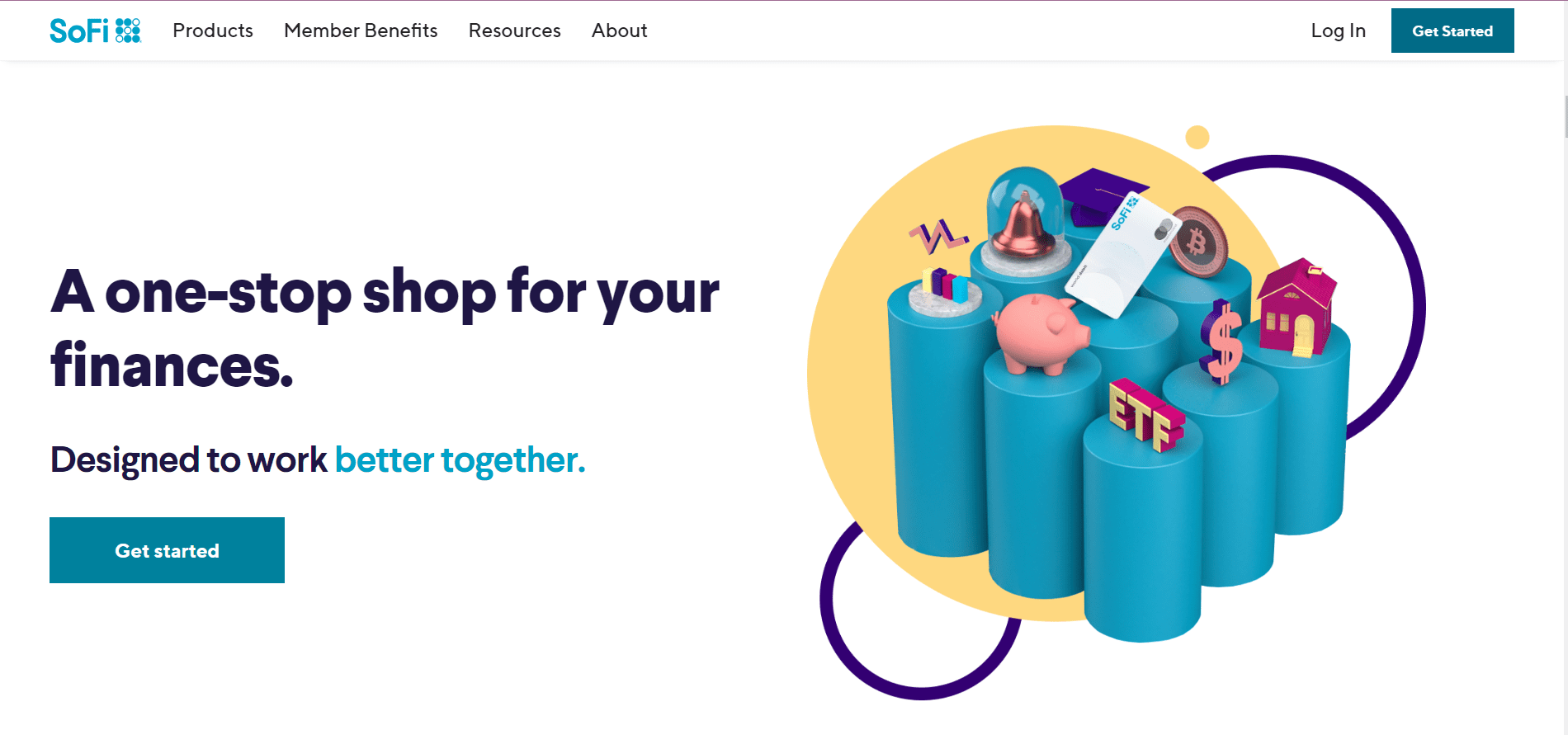
One of the key advantages of SoFi Invest is its low fees, including minimal account minimums. It benefits traders interested in commission-free stocks, ETFs, and options trading with zero commissions. Additionally, there are no inactivity fees. However, it’s worth noting that the robo-advisor service does come with a 0.25% fee for accounts valued above $10,000.
The mobile app provided by SoFi is competent and incredibly user-friendly. Users can create personalized watchlists, set price alerts, and customize the built-in news feed to focus on the commodities they are most interested in trading.
Social Finance Inc. (SoFi) is a US-based SEC and FINRA-regulated financial services company. As a SoFi Inc. subsidiary, SoFi Invest is also regulated by the SEC and FINRA.
 Pros:
Pros:
- Low fees and account minimums
- Commission-free stock and ETF trading
- Multiple account options
- Varying investment options
- Very intuitive app
- No withdrawal fees
 Cons:
Cons:
- Only invests in US assets
- Limited research materials
4. Forex.com – Best Commodity Broker for Gold and Silver Trading

What sets this brokerage apart is its focus on research. Forex.com offers daily trade ideas that can help you spot opportunities in the global metals and energy markets. The trade ideas are presented clearly, with entry and exit points and a clear investment thesis. In addition, Forex.com calculates pivot points for gold and silver charts that you can use to identify potential support and resistance levels.
The mobile app is quite capable, but also pleasantly easy to use. You can create customized watchlists and price alerts, and tailor the built-in news feed to focus on the commodities you’re most interested in trading. The app also supports limit, stop loss, and trailing stop orders to help you carefully manage risk while trading.
Forex.com doesn’t charge commissions for commodity trading, but the broker’s spreads can be pricey. Gold CFDs, for example, carry a spread of 2.0 pips.
Forex.com is regulated in the US by the National Futures Association and in the UK by the Financial Conduct Authority. The broker offers 24/5 customer support and requires a $100 minimum deposit to open an account.
 Pros:
Pros:
- Trade gold, silver, and crude futures
- Daily trade ideas and pivot points
- User-friendly mobile experience
- Supports trailing stop losses for risk management
- Regulated in the US
 Cons:
Cons:
- Limited selection of commodities to trade
- High spreads for commodity trading
5. Fidelity – Ultra-low Commodity Trading Spreads for Day Trading
Fidelity is a prominent brokerage firm in the United States, known for its extensive range of tools, research resources, and investable assets. The platform caters to experienced traders and new investors, offering a wealth of resources to support their investment endeavors.
Fidelity strives to keep costs low for its clients by charging minimal or no fees for many of its offerings. Opening a basic brokerage account does not require a minimum deposit, making it accessible to investors with varying budgets. The Fidelity Mobile app also allows users to trade fractional shares, enabling them to build a diversified stock portfolio even with limited funds.
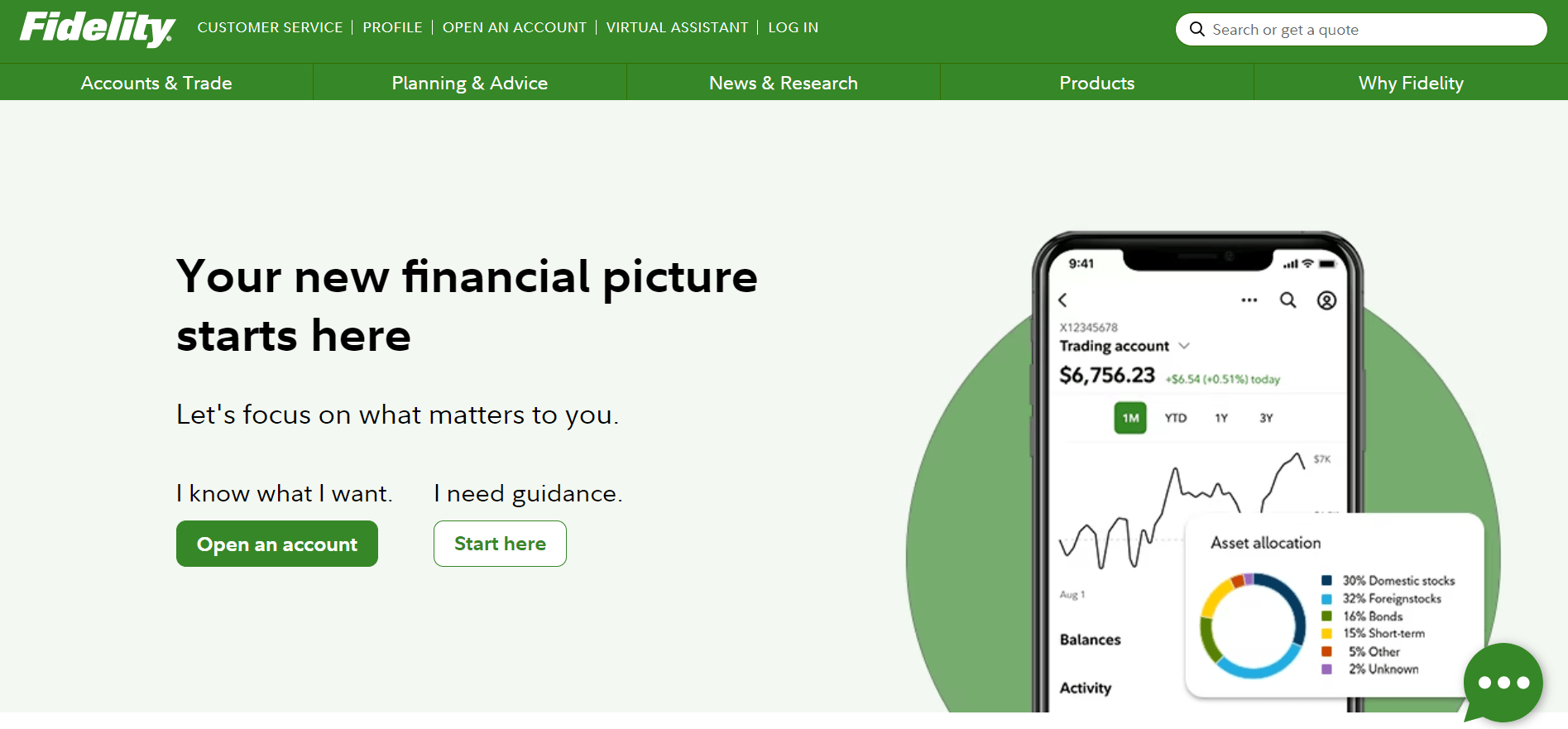
While Fidelity’s website provides access to various trades, users also have the option to download the Active Trader Pro platform. This platform offers advanced order types, real-time streaming market updates, and a customizable experience tailored to individual preferences.
Fidelity provides trading tools to assist users in identifying investment opportunities and executing trades. These tools include news updates, stock quotes, research resources, and a comprehensive learning center featuring webinars and articles. The platform also offers alerts and watch lists to monitor potential trade opportunities.
In the United States, Fidelity Investments operates under the Securities and Exchange Commission (SEC) regulation, is a member of the Financial Industry Regulatory Authority (FINRA), and adheres to US securities laws.
 Pros:
Pros:
- Zero-commission stock trading
- Extensive library of tradable assets
- Strong educational focus
- Rapid trade executions
- Powerful research tools and asset screeners
 Cons:
Cons:
- No opportunity to invest in cryptocurrency
6. TD Ameritrade – Best Commodity Trading App for Technical Analysis
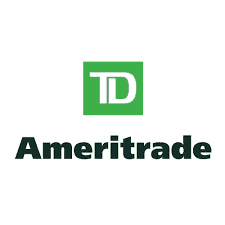
The Thinkorswim app comes packed with over 100 technical studies and indicators, customisable drawing tools, flexible alerts, and more. Even better, Thinkorswim has its own scripting language so you can design your own indicators and then test them out using historical price data. This is a little bit difficult to manage on the mobile app, but you can easily design your indicators through the web app and they’ll instantly be available in your mobile account.
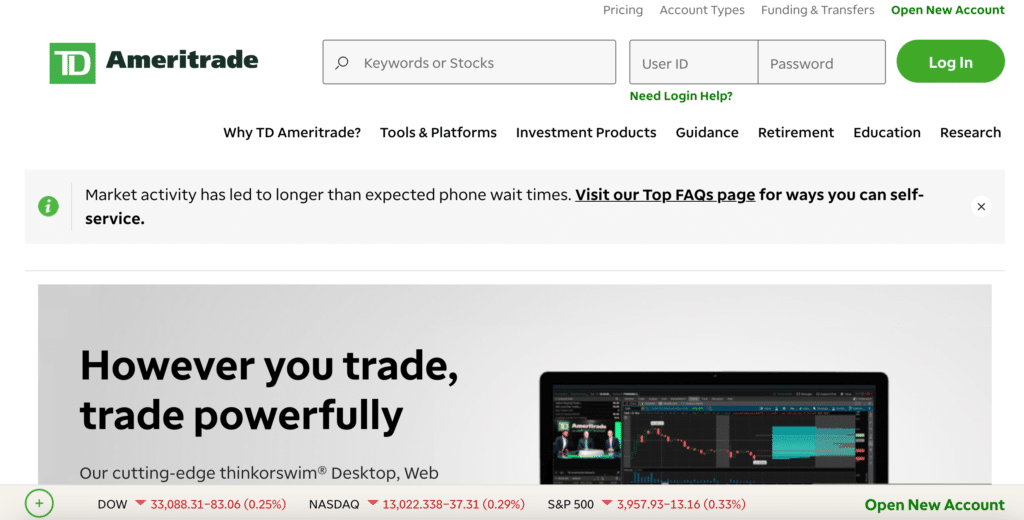
TD Ameritrade also offers its own brokerage app that’s more focused on management of the best stock portfolio tracker. However, it does have a few tricks up its sleeve, including compatibility with devices like the Apple Watch. You can instantly see the performance of top commodities on your wrist and have price alerts pushed to your device.
TD Ameritrade only offers commodities trading through futures contracts, not through CFDs. So, you must speculate on the timing of price movements as well as their direction. A handful of commodities, including gold, silver, light sweet crude, corn, and soybeans can be traded with options contracts. This is key since it enables you to develop complex hedging strategies and add to your leverage.
TD Ameritrade charges a $2.25 commission on all futures and commodity options trades. The broker doesn’t charge additional spreads.
Commodity trading at TD Ameritrade is regulated by the Commodity Futures Trading Commission in the US. As the broker is one of the largest in the US, it’s considered highly trustworthy. TD Ameritrade offers 24/7 in-app customer support, and the broker prides itself on catering to new and experienced traders alike. There’s no minimum deposit to open a new account.
 Pros:
Pros:
- Powerful Thinkorswim mobile app
- Built custom indicators with Thinkorswim scripting
- Trade commodity futures and options contracts
- 24/7 in-app customer support
- Regulated in the US and widely trusted
 Cons:
Cons:
- $2.25 commission per commodity trade
- Does not offer commodity spot CFDs
7. IG – Widest Range of Hard and Soft Commodities to Trade
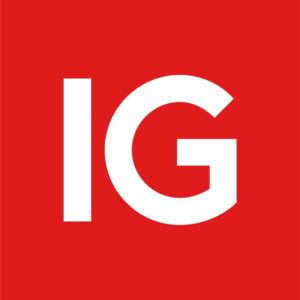
IG doesn’t charge a commission for either CFD trading or spread betting. Spreads start at just 0.3 pips for gold trading and 2.8 pips for crude oil trading.
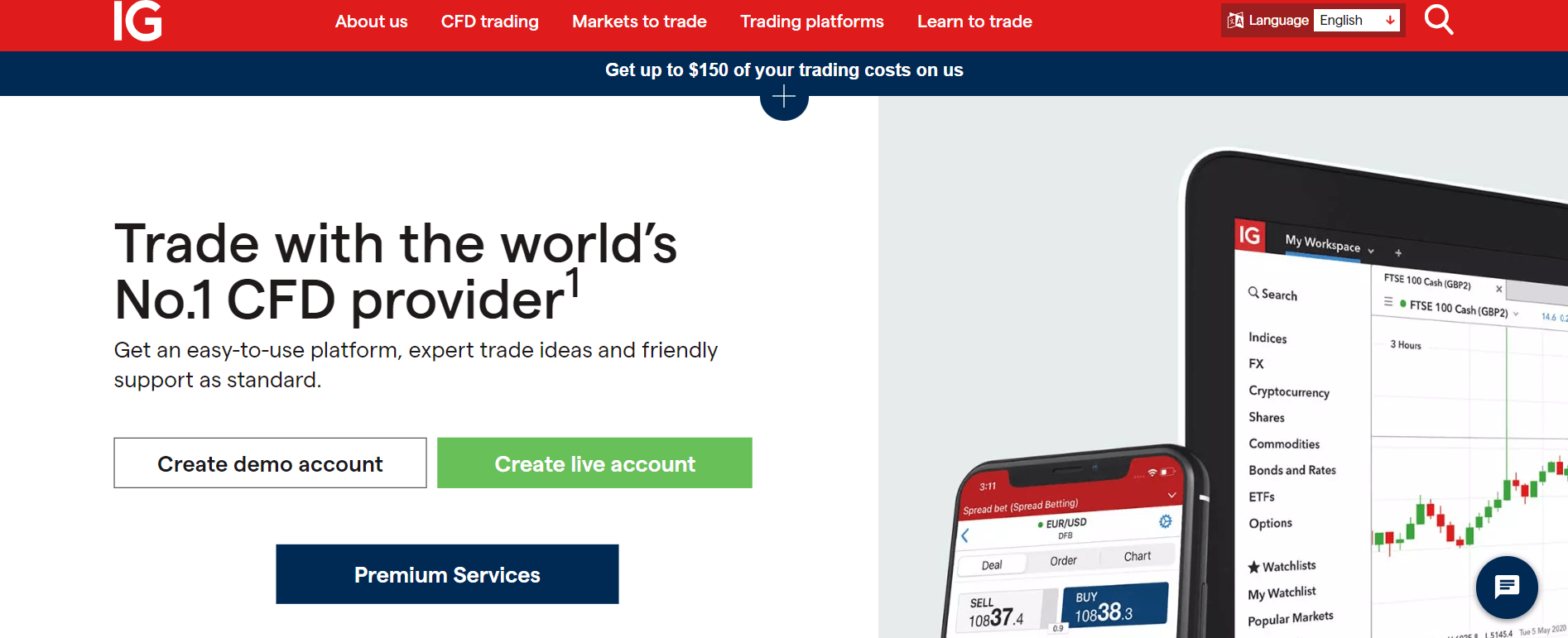
The broker has several different trading platforms to choose from. IG’s custom app offers exceptional technical analysis features, including the ability to overlay multiple indicators in a full-screen format. The app also offers complex order types, such as trailing stops and one-cancels-the-other orders, so you can manage your risk in fast-moving markets. The app won the 2020 Best Finance App award at the ADVFN International Financial Awards.
While most traders will be happy with IG’s app, the broker also offers mobile apps from ProRealTime and MetaTrader 4. Both platforms allow you to create custom trading strategies and backtest against historical price data. They also offer more flexibility in creating trade alerts and entering complex orders.
IG is regulated by the UK Financial Conduct Authority and is a publicly traded company in the FTSE 250.
 Pros:
Pros:
- Trade 35 commodities with spot and futures contracts
- Supports spread betting and CFD trading (Spread betting is only available to clients in the UK).
- Spreads start at just 0.3 pips for gold trading
- IG app won the 2020 Best Finance App award
- Supports MetaTrader 4 and ProRealTime apps
 Cons:
Cons:
- Commodity trading not available for US traders
8. Interactive Brokers – Best Android Commodity Trading App for Algo Trading

Interactive Brokers gives futures traders a choice when it comes to pricing. If you want a fixed commission, you will pay $0.85 per contract with no additional spread. If you trade in high volumes, you may benefit from IB’s tiered pricing system. Commissions can drop as low as $0.25 per trade when you trade at least 20,000 contracts per month.
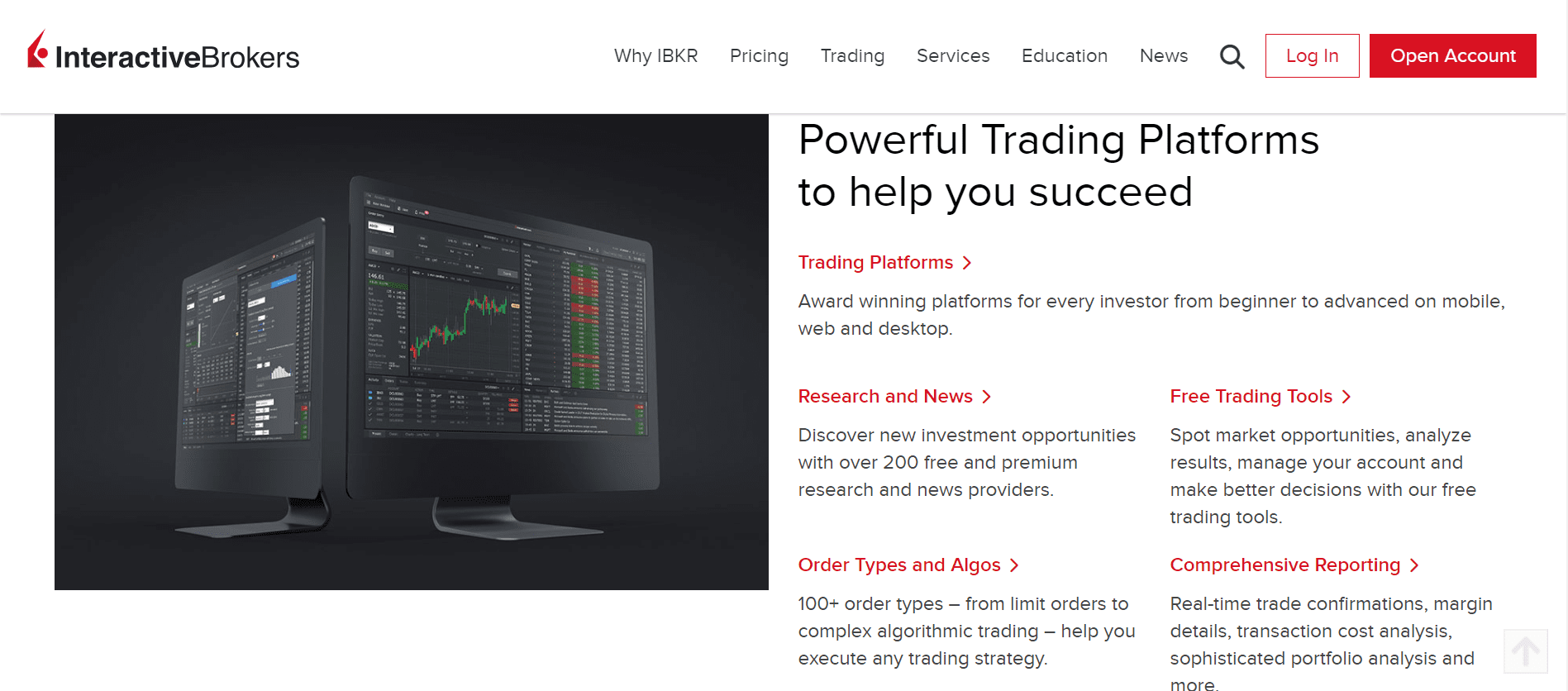
The Interactive Brokers app stands out for the in-depth features it offers traders, particularly around automated trading. The app offers an AI-enabled trade assistant that can help you identify opportunities and set up automated trades in advance. You can also connect to the Interactive Broker API to develop custom trading apps, or connect a third-party algo trading service.
Of course, the app does cater to less experienced traders who simply want to trade manually. You get access to custom watchlists, a futures scanner, and advanced charting and analysis tools. The app is so easy to use, in fact, that Interactive Brokers was rated the Best Online Broker by Barron’s in 2019.
Interactive Brokers is regulated by the US Securities and Exchange Commission and the Commodity Futures Trading Commission. Support is available 5 days a week, but only during US market hours.
 Pros:
Pros:
- Trade futures contracts for dozens of commodities
- Gold and silver spot contracts with ultra-low spreads (non-US only)
- Volume-based fee structure is good for high-volume traders
- Advanced algorithmic trading tools and API access
- Regulated by the SEC and CFTC
 Cons:
Cons:
- Spot contracts not available to US traders
- Support only during market hours
9. Charles Schwab – Best Commodity Broker for New Traders
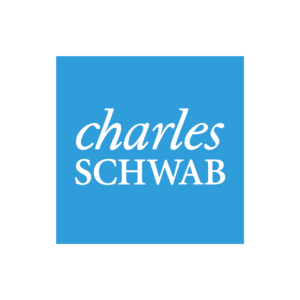
Trading with the Charles Schwab mobile app is fairly inexpensive. You’ll pay a commission of $1.50 per futures contract trade, and no additional spread. Notably, Schwab also offers a guarantee with your commission. If you’re not satisfied with the broker’s execution, you can get your money back.
The Charles Schwab trading app looks a little outdated, especially when compared to some of the more robust commodity trading apps we’ve reviewed. However, if you can overlook the slightly clunky user interface, it has many of the tools you’d expect for commodity trading. For instance, you can quickly review contract prices and set up custom watchlists. The app even integrates with the Apple Watch to help you monitor the market without pulling out your phone.
The main thing missing is the ability to conduct technical analysis from your smartphone. The Schwab app doesn’t offer customizable technical charts or studies, so you’re largely left to eyeball commodity prices. This can be a good thing for new traders who want to ease into the market, but you’ll likely need a second app for technical analysis if you choose Schwab as your broker.
Charles Schwab doesn’t require a minimum deposit to open an account. The broker is regulated by the SEC and CFTC, and you can get help with your account 24/7.
 Pros:
Pros:
- Trade unique futures for steel and electricity prices
- Commission backed by satisfaction guarantee
- Easy to use mobile app with Apple Watch integration
- 24/7 customer support
- Regulated in the US
 Cons:
Cons:
- Mobile app does not offer technical analysis tools
- Limited selection of commodities and no spot contract
10. E*Trade – Popular Stock App Offering Commodity Derivatives
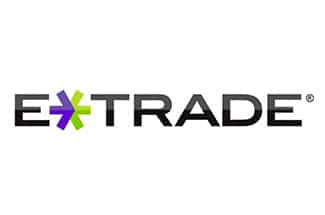
In terms of fees, E*Trade stands out by not charging users for stock trading and having no set minimum investment amount. While there are no base commissions for options trades, users are charged $0.65 per contract. E*Trade does not charge annual maintenance or inactivity fees, but users may need to pay $75 for a total transfer out and $25 for partial transfers.
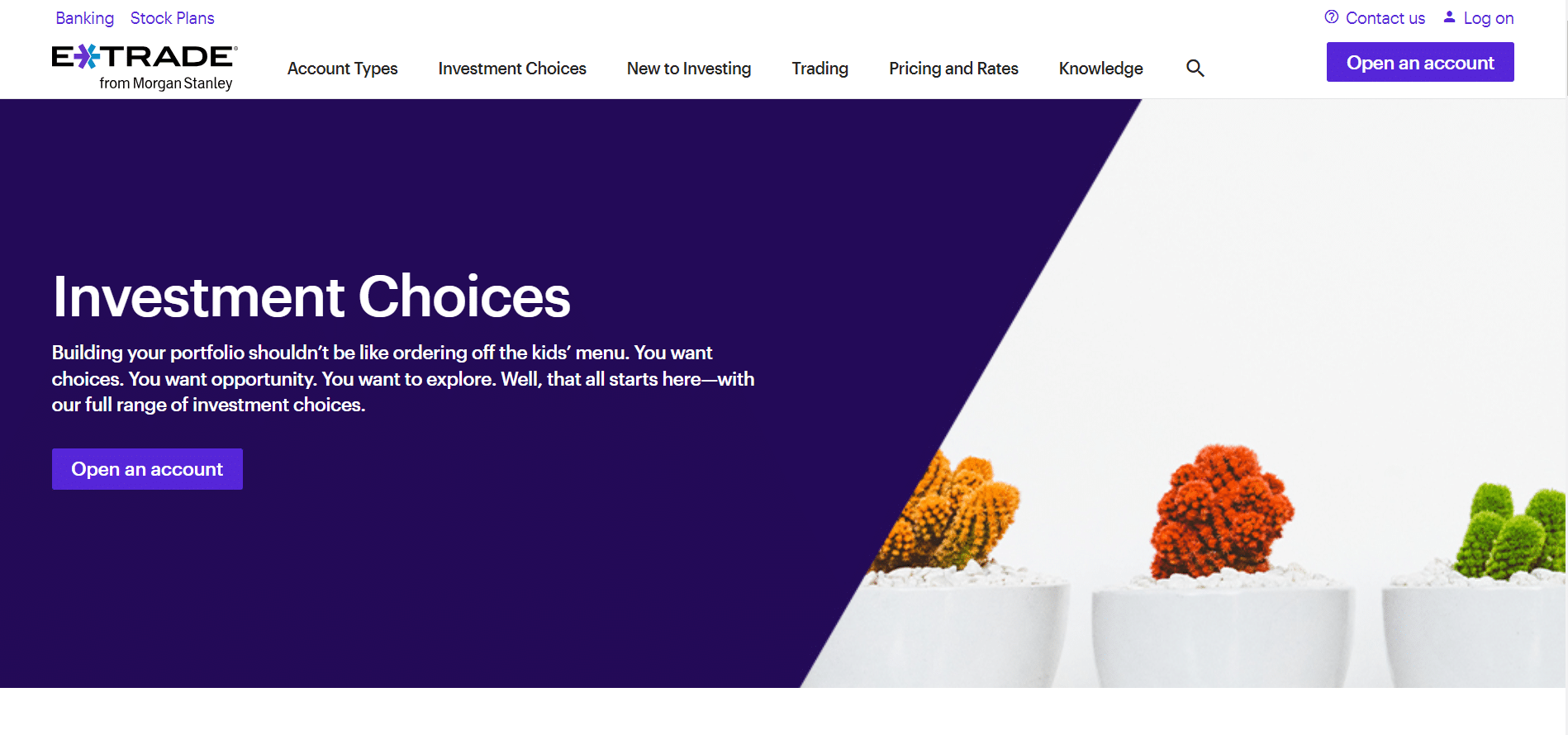
E*Trade provides several quality trading platforms. While the platform may be challenging, its interface can be customized to suit individual preferences. With two web-based platforms, E*Trade caters to both beginner and advanced traders.
E*TRADE is a US stockbroker regulated by top-tier authorities, including the Securities and Exchange Commission (SEC) and the Financial Industry Regulatory Authority (FINRA).
 Pros:
Pros:
- Huge selection of stocks and options
- Commission-free stock, options, and ETF trades.
- Access to extensive research
- Large investment selection
 Cons:
Cons:
- The website can be complex to navigate
76% of retail investor accounts lose money when trading CFDs with this provider. You should consider whether you can afford to take the high risk of losing your money.
Commodity Trading Apps Fees Comparison
Now that you know more about the 10 best commodity trading apps for 2024, let’s see how they stack up when it comes to pricing:
Commission
Spot Gold Spread
Spot Crude Oil Spread
Deposit Fee
Withdrawal Fee
Inactivity Fee
eToro
None
45 pips
5 pips
None
$5 per withdrawal
$10 per month after 12 months
Robinhood
None
N/A
N/A
None
None
None
SoFi
None
N/A
N/A
up to $4.95
None
$25 after 12 months
Forex.com
None
2.0 pips
N/A
None
$25 per withdrawal under $10,000
$15 per month after 12 months
Fidelity
$0.65 fee per contract
N/A
N/A
N/A
None
None
TD Ameritrade
$2.25 per contract
N/A
N/A
None
None
None
IG
None
0.3 pips
2.8 pips
None
None
$12 per month after 24 months
Interactive Brokers
$0.25-$0.85 per contract
0.15 pips
N/A
None
None
$20 per month
Charles Schwab
$1.50 per contract
None
None
None
None
N/A
E*Forex
$0.65 per options contract
N/A
N/A
None
None
N/A
76% of retail investor accounts lose money when trading CFDs with this provider. You should consider whether you can afford to take the high risk of losing your money.
Commodity Trading Explained
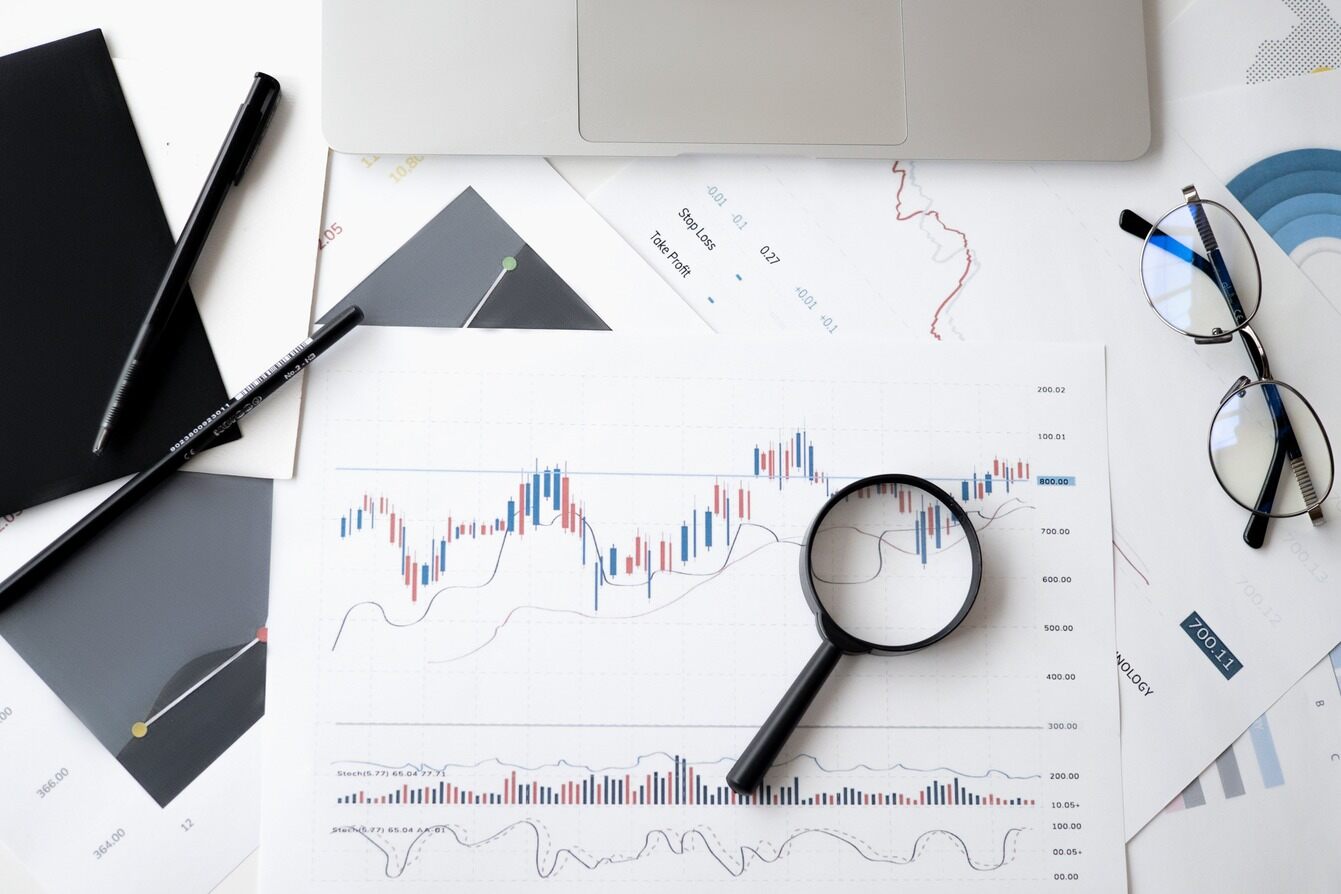
Commodity trading involves speculating on the prices of physical assets such as gold, crude oil, soybeans, and more. Commodities are any widely used product that is typically bought or sold in bulk. You can trade precious metals, energy products, or agricultural products.
An important thing to know about commodity trading is that you never actually own the underlying asset. That is, if you want to trade crude oil because you think the price will rise, you don’t have to take delivery of a barrel of crude and then arrange shipping for it when you sell it.
Instead, commodity trading relies on derivatives like CFDs (contracts for difference), futures contracts, and options.
With CFDs, you simply speculate on the price of a commodity – you can go long if you think it will go up or short if you think it will fall. CFD contracts don’t have expiration dates, so you only need to worry about the direction of the price movement, not the timing of it.
With futures contracts, you speculate on both the direction and timing of a price movement. That’s because futures contracts have expirations dates. So, the anticipated price movement must happen on or before the expiration date or else your contract will expire worthless.
Some commodity brokers also offer options trading on commodity futures contracts. Options trading allows for a wider range of trading strategies, including hedging.
76% of retail investor accounts lose money when trading CFDs with this provider. You should consider whether you can afford to take the high risk of losing your money.
Is Commodity Trading Profitable?
Commodity trading can be profitable if you understand how the commodities market works. To make money trading commodities, you will need to conduct thorough research and analysis to make informed trading decisions. Profits are made when you buy commodities at a low price and sell them when the price goes up- the difference between the two prices is the profits that you will secure. It is also possible to earn through dividends- some commodities stocks pay regular dividends to investors which can accumulate over time.
Never the less, the commodities market can be volatile and your money is at risk. To maximize your chances of success, consider practicing with a paper trading account before you use any real money to trade commodities.
How Much Money Do You Need To Start Commodity Trading?
The amount of money that you need to start commodity trading depends on the trading platform that you use. Each commodity trading platform will have a minimum deposit requirement and fee structure that will determine that amount of funds you need. For example, the minimum deposit to trade of eToro is $50 which means that you can start commodity trading from $50. However, some platforms have higher minimum deposit requirements – it is a good idea to look into this before deciding on a commodity trading platform. It is also a good idea to consider any trading fees that you may need to pay. You should have enough funds in your trading account to cover any fees that are applicable to commodity trading.
76% of retail investor accounts lose money when trading CFDs with this provider. You should consider whether you can afford to take the high risk of losing your money.
How to Choose the Best Commodity Trading App for You
With so many commodity trading apps to choose from, how do you decide which one is right for your needs? Let’s take a closer look at some of the factors you need to consider when picking the top commodity trading app.
Regulation
All of the top commodity trading apps we reviewed are regulated by a national financial watchdog. This is critical to ensure that your trades are executed fairly and that your money is safe inside your brokerage account. When considering commodity brokers, always look for one that is regulated.
User Experience
The mobile user experience will play a big role in how successful you are trading commodities. The better the user interface, the more informed you’ll be when making trading decisions and the more quickly you’ll be able to place trades.
There’s no single factor to look for when evaluating an app’s trading experience. Whenever possible, try out a broker’s mobile app with a demo trading app account before committing to that broker. It should be easy to move from real time technical analysis to order entry.
Tradable Assets
Another important thing to consider when choosing the best broker is what types of commodities you can trade. Some brokers only offer trading on the most popular commodities, like gold, silver, and crude oil. Others offer a wide variety of precious metals and agricultural products.
Be sure to check whether you can trade spot CFDs, futures, or options. Spot CFDs allow you to speculate only on the direction of future price movements, while futures and options require you to speculate on the timing of price movements.
Fees
Most commodity trading apps charge fees in the form of commissions and spreads. Commissions are fixed fees for every contract you trade. Spreads are variable fees that are charged as a percentage of your trade value.
In addition, watch out for account fees such as deposit, withdrawal, and inactivity fees.
Trading Tools
Having a variety of trading tools available is important to making decisions about what commodities to trade and when. At a minimum, your brokerage app should offer customizable watchlists and a technical charting platform.
Many go beyond this, offering trade ideas, price alerts, and even the ability to create your own unique technical studies. Some brokers, like eToro and AvaTrade, also have a built-in social trading app where you can share trading strategies and copy the moves of more experienced traders.
Payment Methods
Another thing to consider is what payment methods you can use to fund your commodity trading account.
Some brokers only accept bank transfers, while others also accept debit and credit cards. If you use mobile-friendly payment methods like Apple Pay or Google Pay, look for brokers that accept these payment options.
Customer Service
Having access to customer service when you need it is incredibly important. That’s why many of the best commodity trading apps offer 24/5 or 24/7 support. Check whether you can get in touch by phone, email, or live chat. Ideally, you should be able to access chat support from inside the broker’s mobile app.
76% of retail investor accounts lose money when trading CFDs with this provider. You should consider whether you can afford to take the high risk of losing your money.
How to Download a Commodity Trading App & Start Trading
Ready to start trading commodities? We’ll show you how to get started with the eToro app.
76% of retail investor accounts lose money when trading CFDs with this provider. You should consider whether you can afford to take the high risk of losing your money.
eToro – Best Commodity Trading App
Commodity trading enables you to speculate on the prices of metals, energy products, and agricultural products. You can trade with spot contracts, futures contracts, and even options, depending on the broker you choose. Thanks to our reviews of the 10 best commodity trading apps for 2024, it’s easier than ever to start trading commodities.
Ready to trade with the #1 commodity broker for 2024? Click the link below to get started with eToro today!
76% of retail investor accounts lose money when trading CFDs with this provider. You should consider whether you can afford to take the high risk of losing your money.
References
- https://www.forbes.com/advisor/investing/commodities-trading/
- https://www.britannica.com/money/topic/commodity-trade
- https://www.cftc.gov/
- https://www.usda.gov/oce/commodity-markets
- https://www.investor.gov/introduction-investing/investing-basics/investment-products/commodities

